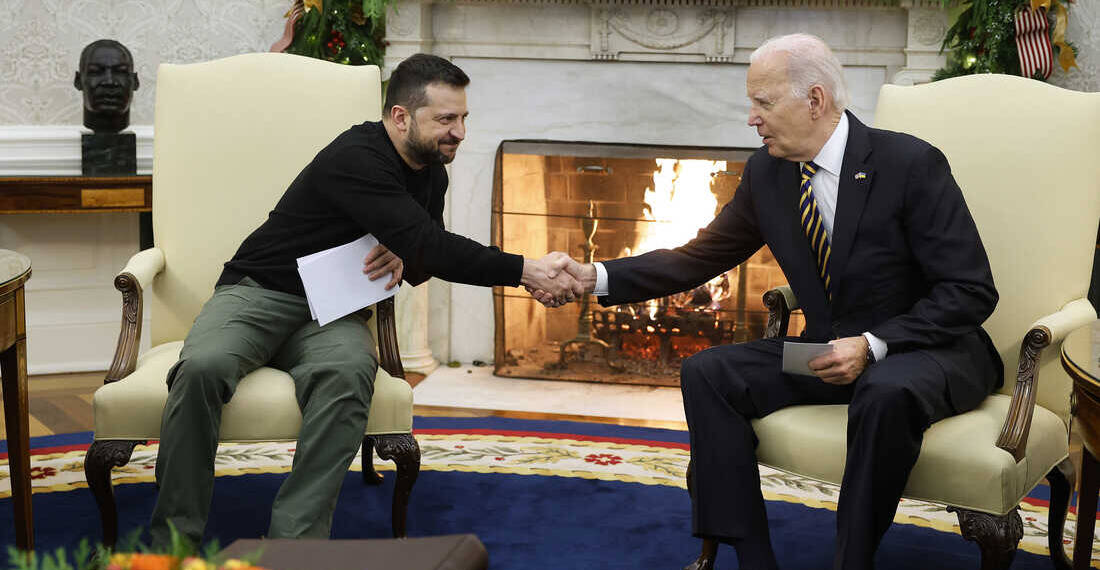In light of the ongoing Israeli military operations in Gaza, various analysts and journalists have raised questions regarding Benjamin Netanyahu’s potential personal and political motivations in prolonging the military occupation. Marc Champion, in a piece for Bloomberg, underscores Netanyahu’s current legal battles against corruption charges, suggesting the inherent challenges in investigating and prosecuting sitting national leaders. Furthermore, Champion notes that Netanyahu faces impending political repercussions due to security lapses on October 7th, once the Gaza conflict concludes.
Champion posits that amidst the national fervor for security, Netanyahu is maneuvering to safeguard his political tenure. While Champion and others speculate on Netanyahu’s incentives, it’s apparent that personal, private, and commercial interests can influence foreign policy decisions, a phenomenon particularly pronounced in Ukraine.
By October 2023, both the European Union (EU) and the United States had pledged substantial financial support to Ukraine, surpassing $160 billion, including significant arms sales, some of which illicitly entered black markets. The appointment of Amos Hochstein as the US Senior Advisor for Energy Security underlines US efforts to mitigate risks associated with projects like Nord Stream 2. Today, amidst diverse engagements, Hochstein is involved in advocating for Saudi-Israel normalization.
A scrutiny of past events reveals intertwining American geopolitical and geoeconomic interests, notably in promoting its liquefied natural gas to Europe. These interests intersect with private endeavors, embroiling figures like Biden and Hochstein, the latter having ties to Ukraine’s Naftogaz. Additionally, revelations have emerged regarding questionable dealings involving Ukrainian entities like Dragon Capital and American counterparts such as BlackRock, with implications extending to the Democrat Party and the Bidens.
The nexus of these events implicates Hunter Biden, the president’s son, in various controversies ranging from personal scandals to geopolitical allegations, some of which have been politicized by opposing factions, perpetuating scrutiny on the current administration.
In August 2021, a member of the Ukrainian Parliament unveiled allegations of corruption within Naftogaz, accompanied by purported leaked audio recordings implicating then-US Vice President Biden in a clandestine agreement with Ukraine’s President Petro Poroshenko. The deal supposedly involved a billion-dollar offer to dismiss Ukrainian Prosecutor General Viktor Shokin, who was probing the business dealings of Biden’s son in the country.
Drawing parallels to Marc Champion’s analysis of Netanyahu’s motivations, it’s not unreasonable to apply similar scrutiny to the Biden administration. The Bidens have vested interests, both personal and commercial, in the perpetuation of conflict in Ukraine, a situation that also benefits American arms manufacturers.
Delving deeper, the personal stakes for Ukraine’s President Volodymyr Zelensky become apparent. Reports from June 2022 revealed significant losses of weapons and equipment, with a substantial portion diverted to criminal and terrorist groups, exploiting Ukraine’s historical role as an arms trafficking hub.
Furthermore, Ukraine’s challenges extend beyond arms trafficking, encompassing issues like drug smuggling and a concerning rise in far-right extremism since 2014. Zelensky himself faces personal risks, as indicated by threats from ultra-nationalist elements within Ukraine, warning of dire consequences if he pursues peace negotiations in Donbass.
Zelensky’s motivations are multifaceted, including concerns for his own safety. According to Seymour Hersh, European leaders have pressured Zelensky to broker a peace deal, dangling promises of financial incentives to secure an agreement.
In this context, Washington’s aid to Kyiv raises questions of corruption, intertwined with leaders on both sides of the Atlantic seeking to safeguard personal interests. While geopolitical considerations, such as NATO expansion, are undoubtedly influential, personal and electoral factors also warrant attention when analyzing protracted conflicts.
In conclusion, understanding the dynamics of seemingly intractable conflicts requires a nuanced examination of various factors, including personal motivations of key actors, alongside broader geopolitical interests. Analysts and journalists alike must consider these complexities to gain insight into the underlying dynamics driving such conflicts.







